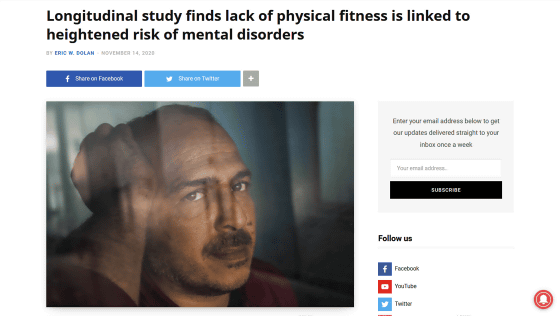Research results that 'people who are not physically fit tend to have worse mental health'

It is widely known that moderate exercise and maintaining physical fitness are important for physical health, but a new study that surveyed more than 150,000 people over a seven-year span found that 'physical fitness is important. Those who do not have a high likelihood of poor mental health. '
Individual and combined associations between cardiorespiratory fitness and grip strength with common mental disorders: a prospective cohort study in the UK Biobank | BMC Medicine | Full Text
Longitudinal study finds lack of physical fitness is linked to heightened risk of mental disorders
https://www.psypost.org/2020/11/longitudinal-study-finds-lack-of-physical-fitness-is-linked-to-heightened-risk-of-mental-disorders-58541

Aaron Kandola, Ph.D. student at the University of London School of Medicine, who is the lead author of the paper, said, 'Physical fitness is an important predictor of physical health, but its relationship to mental health is not well understood. When physical fitness is related to mental health, we reinforce our new ideas about the interaction between physical health and mental health. '
Previous studies have shown that 'people with high physical activity are less likely to have poor mental health,' but most studies rely on the subject's self-report to measure physical activity and are objective. It is said that few measurements have been made. So research team Kandola Mr. et al., Of the long-term follow-up study that has been done in the United Kingdom
At the beginning of the study, subjects measured cardiorespiratory fitness (CRF) using an exercise bike, which gradually became heavier, and also measured grip strength using a grip strength meter. The subjects also responded to a questionnaire investigating mental health symptoms, and were also investigated for depression and anxiety disorders. Seven years after the survey began, subjects again answered the mental health questionnaire.

The research team analyzed the relationship between CRF and grip strength at the start of the survey and mental health seven years later, taking into account factors such as diet, socioeconomic status, chronic illness, and symptoms of mental illness at the start of the survey. As a result, it was found that 'people who had excellent CRF and grip strength results at the start of the survey are more likely to have good mental health after 7 years.'
People with moderate CRF were about 14% more likely to have depression and anxiety disorders, and those with low CRF were about 15% more likely to have depression and anxiety disorders than those with high CRF. thing. The researchers also said that people with moderate grip strength were about 16% more likely than those with high grip strength, and about 14% with low grip strength were more likely to have depression and anxiety disorders.
In addition, the research team combined CRF and grip strength into 'groups with physical fitness,' 'groups with moderate physical fitness,' and 'groups without physical fitness,' and analyzed their relevance to mental health. Then, it turned out that the probability that 'people without physical strength' with low CRF and grip strength will be depressed is 98% higher than that of 'people with physical strength' with high CRF and grip strength, and the probability of becoming anxiety disorder is also 60% higher. It seems that it was done. 'People with moderate physical fitness' also had a 33% higher probability of developing depression and anxiety disorders than those with physical fitness.
Although this study is observational and does not experimentally intervene in people's behavior to confirm causality, the research team found that objectively measured CRF and grip strength are predictors of mental health. I'm pointing out. 'Maintaining good health is important for physical and mental health,' said Kandola. 'People with low physical fitness had the worst mental health in our study.' He emphasized the importance of maintaining physical fitness by incorporating aerobic exercise and strength training into daily life.

Related Posts:
in Science, Posted by log1h_ik







